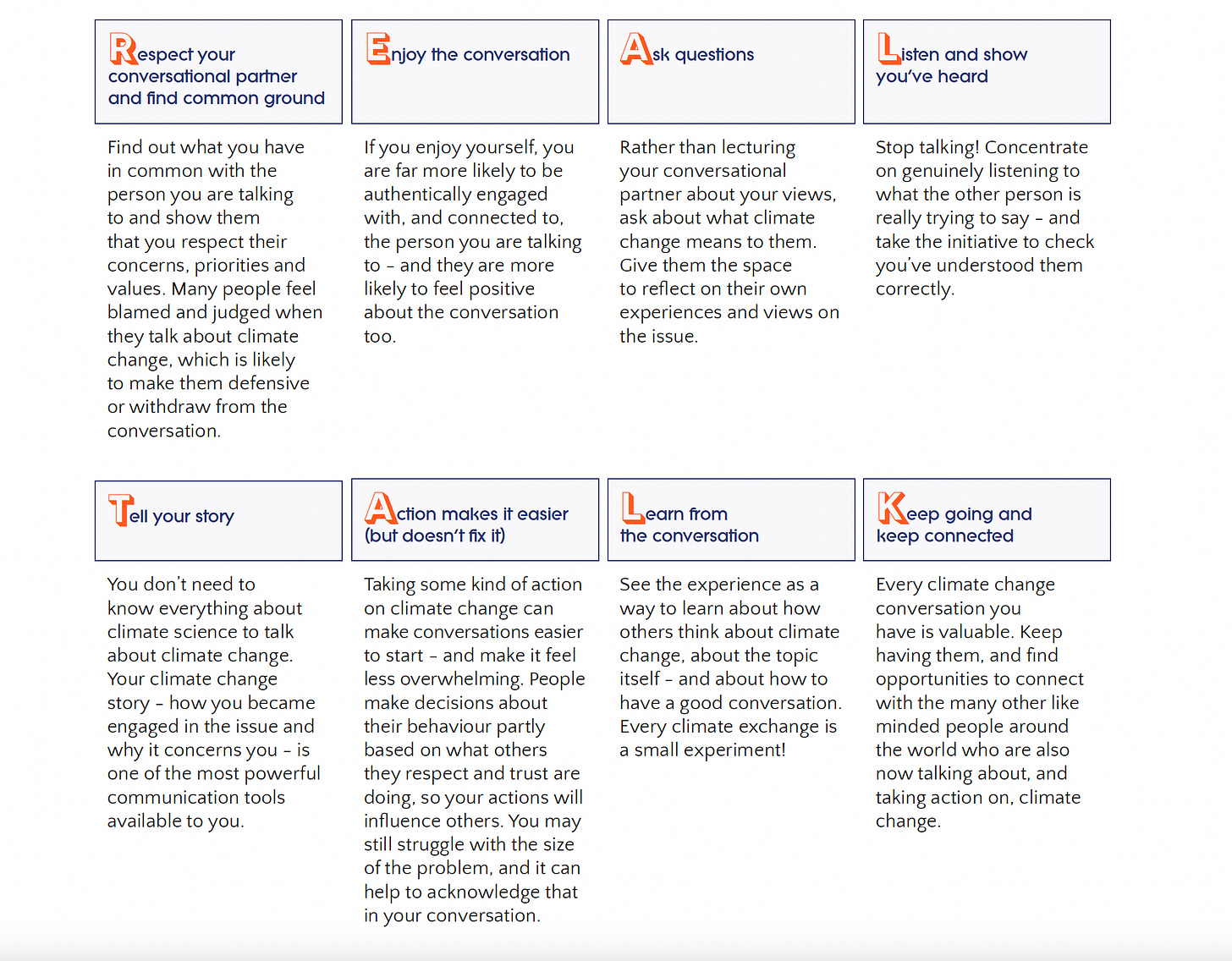Get your climate priorities straight
Facts: Get your climate priorities straight 〰️📏 | Feelings: "Disappointed in humanity" 😔💔| Action: Effective, depolarizing climate conversations 🗣️👂
Hi friends, welcome back! This month I’m writing from Berlin, where I joined a workshop on One Health (linking human + animal + environmental health). It’s been wonderful to see so many folks in person this fall— at book talks, coffee with a reader in Exeter, a tour of Brussels by a former student…
Do get in touch if your book club, faith group, or company needs a (virtual or in person) pep talk for evidence-based climate action from your favorite climate scientist! You can reply to this email and it comes straight to me.
Now, let’s get our climate priorities in line, handle disappointment in our fellow human beings, and talk about climate effectively and help counter polarization.
Facts: Get Your Climate Priorities Straight
A lot of well-meaning people are missing out on effective climate actions because they’re thinking about emissions at the wrong level.
This is a problem because we need to use our limited time and resources well to reduce emissions fast and fairly.
The most effective actions for the climate depend on who is undertaking them. Effective policy needs to take the responsible actor into account.
-UNDER THE SKY WE MAKE, p. 147
I see examples all the time of using global statistics to argue about the effectiveness of personal, national, or company actions, or vice versa.
Unfortunately, this often doesn’t add up.
Here’s a common example:
“Flying is just a few percent of emissions. What’s the point in me flying less?”
— a lot of frequent flyers :)
It’s true emissions from flying are small at the GLOBAL level. But for an INDIVIDUAL high emitter, flying is likely their largest source of emissions, and thus their most effective opportunity to reduce many tons of carbon. Compare the blue slice from flying in this individual vs. global breakdown of emissions:

For high emitters, flying is over 41% of their consumption-based climate footprints. That’s >20x higher than the sector’s share of the global footprint.
These are estimates from comprehensive EU household data. For frequent flyers, it’s not uncommon that flying is 2/3 of their personal footprint or more, as climate scientist Peter Kalmus found before he cut his footprint dramatically.
For high emitters, driving is over 21%, almost 2x the proportion of the global road transport sector.
To get our climate priorities straight, ask yourself 2 guiding questions:
1. What emissions do you have some power to reduce?
The answer depends on which of your 5 climate superpower roles you’re playing, or who exactly you’re trying to influence to do what. Are we talking about actions you have the power to implement today? Actions you want titans of industry to take? Policies you want your national elected officials to adopt? Define your system boundaries, please. :)
Remember, 90% of the world does not need to reduce their carbon footprint.
But those of us in the global top 10% (earning over $38,000/year) do need to reduce our overconsumption. The higher our income, the more likely the majority of our emissions come from flying and driving. This makes reducing flying and driving consistently high-impact personal climate actions.
If we’re talking about your professional role, advocating for reductions at your workplace, you’ll need to analyze where your organization’s emissions come from to target reductions effectively. For example, in academia, flying causes about 2/3 as many emissions as campus operations, so it’s a major lever for reductions. For the wine industry, key focus areas are farming, wine packaging, and transport, which together are almost 60% of emissions.
2. Who else can you bring along with you?
Any way you slice it, all of the carbon pie pieces need to be shrinking towards zero emissions fast. Whatever level or role you pick, get on with your bad self in focusing on high-impact actions to reduce emissions. And support others working at other levels, in other sectors, in their work. Remember, system change is a circle, not a waterfall.
We need all the action. But please, wherever you start, let’s focus on making action as effective as possible.
Feelings: “Disappointed in humanity”
I’ve been thinking a lot about this reader question:
When I talk to people about the climate crisis, I often hear a sense of disappointment in society and our fellow human beings. What do you say to people who feel that way?
- Sofia, We Can Fix It reader
This is such a big, messy, important question. And it’s so heartbreakingly relevant when so many things in the world are so broken.
There are no simple answers to this question. But one thing I find helpful is to try to move past “either/or” thinking, and embrace “both/and.”
I crave clarity and certainty. But I find that making, or wallowing in, sweeping judgments about fundamental human nature rarely lead me somewhere good. (I wrote about the link between climate doomism and jumping to conclusions about human nature in the climate privilege chapter of Under the Sky We Make.)
Instead, I try to create enough space to bear witness to loss, and still have room for All the Climate Feels. I want to hold the simultaneous possibility of two truths:
Terrible things happen. Society and our fellow human beings can deeply let us down.
And. Most people are doing their best and want to help.
Both of these things can be true at the same time.
I found my conversation with Dr. Britt Wray about “expanding your window of tolerance” nourishing; maybe a listen would give you a boost?
If you want to take positive action to help others during disasters, here are my tips.
And I love this reminder from
:
Action: Depolarize Climate Convos
Personal conversations with people we trust are a huge spark for climate action.
I’ve experienced this myself. After many, many years of reading (and writing!) papers filled with climate data, it was a heart-to-heart with a friend that inspired me to stop flying within Europe in 2012. Simon and I recently bought a sailboat, gateway to more low-carbon adventures and even less flying. I can trace the inspiration for taking this plunge to a conversation with a former student 5+ years ago. (You never know what ripples of impact your conversation might have!)
But it can be hard to know how to talk about climate in a constructive way.
The communications charity Climate Outreach has got you covered. These good folks have fabulous, evidence-based resources on effectively Talking Climate. I’ll share some here; please check out and support their work!
Start one-on-one climate conversations
Climate Outreach suggests grounding everyday climate conversations in REAL TALK: Respect, Enjoyment, Asking questions, Listening; and Telling your story, Action as a conversation starter, Learning, and Keep connecting. Check out their climate conversation framework below and in this free 1 hour webinar.

Create non-polarizing dialogue w/ shared values
How can we have productive climate conversations with people who might have different priorities and viewpoints than our own?
Climate Outreach has done extensive research on what resonates with diverse audiences in Alberta, the “Texas of Canada,” as my Albertan husband semi-affectionately calls it. (Hi to my family in Edmonton! <3) These tips apply anywhere for how to approach your audience well, a core tenant of good conversations.
The Alberta Narratives audience report offers tailored language that’s been tested to communicate respectfully and effectively with eight groups: oil sands workers, conservatives, environmentalists, rural Albertans, business leaders, youth, new Canadians, and people of faith.
For example, Climate Outreach suggests focusing on gratitude for hard work and prosperity (not entitlement) when talking to conservatives. For farmers and ranchers, focus on "solutions that make sense within a rural context such as renewable energy”, where solar panels are seen as more realistic than urban-centric biking and electric vehicles.
What not to do: don’t make people feel guilty “for who they are and what they care about”. Note that respectfully challenging people requires strong trust (which takes time to build). Any challenges must “be done in a way that supports their sense of shared identity, and suggests that they hold they keys to solutions.” (p. 58)
Climate Outreach tested language that was consistently approved across all eight groups, and rejected language that any group strongly disliked, with the goal of building a foundation for shared conversation that does not drive polarization. They offer a sample narrative, which can be adapted for authentic, effective communication. For example, to talk about energy:

Host a climate conversation workshop
Ready to level up? If you want to gather and empower a bunch of climate conversationalists, host your own #TalkingClimate workshop!
Climate Outreach has resources including a guide for trainers, a script for the workshop, and slides. They’ve developed this guide based on 33 test workshops in 22 countries. Powerful stuff. Let me know if you give it a try!
Book Recommendation: OUTLIVE: The Science and Art of Longevity, by Peter Attia. Okay, this isn’t a climate book, but I think it’s super relevant! Hear me out. An expert focused on improving “healthspan” (not just quantity, but also quality of life) diagnoses the biggest threats to health and how to prevent them, not just treat their symptoms, so you can build up your resilience and thrive for the long haul. Focused on the few interventions that make the biggest difference, and explaining how they work and why they are so important. This book changed how I think about exercise and made me much more specific in my training (Zone 2 and VO2 max, I’m looking at you!). Stay well, everyone!
xo,
Kim
P.S. I’ve started recording these newsletters as a podcast for paid subscribers, which I narrate myself. If you’d enjoy listening to your climate facts, feels, and action straight from your favorite climate scientist, please upgrade to a paid subscription or sign up below. Thanks for being here!




I loved the two diagrams next to each other showing the difference between global and personal. Also, good ideas for how to talk with and convince people that do not belong to traditional environmentalist groups, that this is important for them too was very helpful.
Thank you. Wise words and a great collection of ideas for encouraging people to keep going when things are looking difficult.